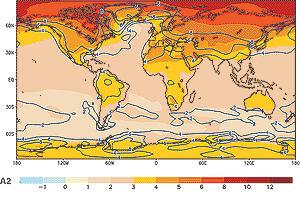 UN General-Secretary Ban Ki-Moon urged world's policymakers yesterday to urgently deal with climate change at next month's summit in Bali. His call comes as the latest report from the Nobel Peace prize winning Intergovernmental Panel on Climate Change (IPCC) shows that global warming is “unequivocal” based on wide ranging evidence. The IPCC has observed changes in global average air and ocean temperatures, widespread melting of snow and ice, and rising global average sea level and have ranked eleven of the last 12 years the warmest since record began in 1850. Ban said the time for doubt has passed and climate change is the defining challenge of our age. “I can tell you with assurance that global, sweeping, concerted action is needed now,” he said. “There is no time to waste.”
UN General-Secretary Ban Ki-Moon urged world's policymakers yesterday to urgently deal with climate change at next month's summit in Bali. His call comes as the latest report from the Nobel Peace prize winning Intergovernmental Panel on Climate Change (IPCC) shows that global warming is “unequivocal” based on wide ranging evidence. The IPCC has observed changes in global average air and ocean temperatures, widespread melting of snow and ice, and rising global average sea level and have ranked eleven of the last 12 years the warmest since record began in 1850. Ban said the time for doubt has passed and climate change is the defining challenge of our age. “I can tell you with assurance that global, sweeping, concerted action is needed now,” he said. “There is no time to waste.”Ban issued the warning as he introduced the fourth assessment report (pdf) of the IPCC. The fourth report synthesises the work of the previous three reports. The gist of the latest report is that worldwide carbon emissions must stop increasing within seven years and greenhouse gas emissions must be reduced by 50 to 85 percent by 2050. It found the earth's average temperature has risen by 0.75 degrees Celsius over the past 100 years. Greenhouse gases emitted by humans increased 70 percent between 1970 to 2004 with the most harmful of those, carbon dioxide, increasing by 80 percent over that period.
The report is the work of thousands of scientific experts (pdf). There were 2,500 scientific reviewers, 800 contributing authors and 450 lead authors from 130 countries. The report said that an average 2 degree Celsius increase in temperature could endanger up to 30 percent of the planet's flora and fauna. It also predicted that almost 250 million people in Africa will suffer from water shortages by 2020. UN Environment Programme Director Achim Steiner said the report was a “compelling blueprint” for action. He said the price tag for failure included “increasing acidification of the oceans to the likely extinctions of economically important biodiversity”.
Ban called on the US and China to take the lead in cutting emissions. Neither country is bound by the current protocol. "I look forward to seeing the US and China playing a more constructive role, starting from the Bali conference,” he said “Both countries can lead in their own way.” The goal of the 11 day Bali December meeting is to agree to start urgent talks on a successor to the Kyoto Protocol on cutting carbon gas emissions. Kyoto expires in 2012.
In the current Australian federal election, neither major party has committed to short-term emission reductions. Opposition leader Kevin Rudd reacted to the report by saying Labor were committed to “swift action” and promised to set intermediate targets within six months of election. However John Howard wasn’t as convinced matters were as dire as Ban and his team of scientists were saying, merely promising the Coalition has a “balanced approach” to combating global warming. He said the report should not be taken out of context because "the world is not coming to an end tomorrow".
 Former leader of the CSIRO's Climate Impact group and contributor to the IPCC Report Dr Barrie Pittock sharply criticised Howard’s comments as “non-committal” and failing to appreciate the urgency of the problem. In his 2007 book “Climate Change - Turning up the Heat” Pittock argues our attitudes to risk and uncertainty influence our decision making. He said climate takes a long time to alter so what we do now will have impacts decades later and market forces must be encouraged to think long term. Pittock says neither Labor nor the Liberals have tackled the problem seriously enough during the election campaign, and says the small incentives offered barely scratch the surface of what is required. “That compares with tens of billions of dollars in commitments for other things,” he said. “I think they've got it completely out of proportion.”
Former leader of the CSIRO's Climate Impact group and contributor to the IPCC Report Dr Barrie Pittock sharply criticised Howard’s comments as “non-committal” and failing to appreciate the urgency of the problem. In his 2007 book “Climate Change - Turning up the Heat” Pittock argues our attitudes to risk and uncertainty influence our decision making. He said climate takes a long time to alter so what we do now will have impacts decades later and market forces must be encouraged to think long term. Pittock says neither Labor nor the Liberals have tackled the problem seriously enough during the election campaign, and says the small incentives offered barely scratch the surface of what is required. “That compares with tens of billions of dollars in commitments for other things,” he said. “I think they've got it completely out of proportion.”

